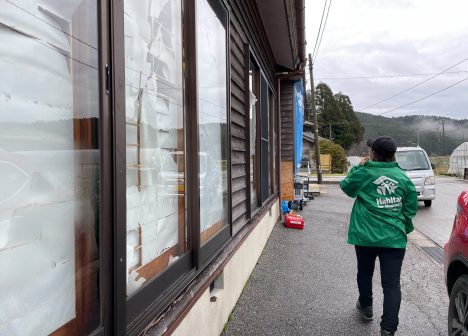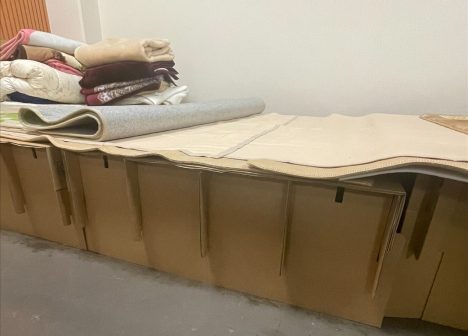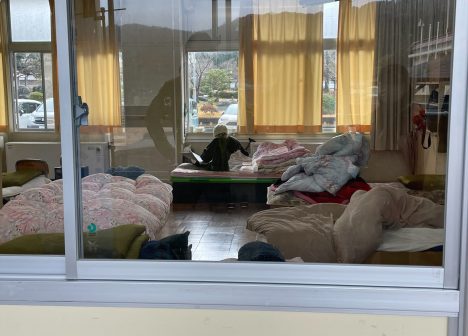Based on the findings of our first needs survey after the Noto Peninsula earthquake, Habitat Japan has established a base of operations in the Monzen-machi district of Wajima City, Ishikawa Prefecture to begin emergency relief efforts.
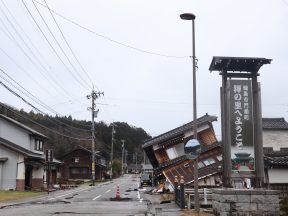 Located in the northeast part of the Noto Peninsula, Monzen-machi belongs to Wajima City. Monzen-machi is home to 4,600 people, making up 20% of Wajima City’s population of 23,000. With the elderly accounting for the majority of Monzen-machi’s thinly spread population, the district suffers from both the ageing population and depopulation crises of Japan. The area was once home to the head temple of the Soto school of Zen Buddhism, earning the district the nickname of “Zen Town”, where many traditional buildings of wooden construction were found.
Located in the northeast part of the Noto Peninsula, Monzen-machi belongs to Wajima City. Monzen-machi is home to 4,600 people, making up 20% of Wajima City’s population of 23,000. With the elderly accounting for the majority of Monzen-machi’s thinly spread population, the district suffers from both the ageing population and depopulation crises of Japan. The area was once home to the head temple of the Soto school of Zen Buddhism, earning the district the nickname of “Zen Town”, where many traditional buildings of wooden construction were found.
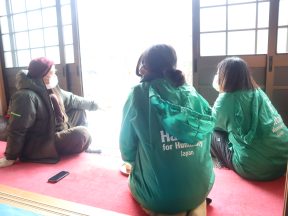 As a result of the earthquake, most of these old buildings were either partially or completely destroyed, forcing over half of the population to relocate to evacuation shelters. Most residents lucky enough to have family in the surrounding area have evacuated with loved ones elsewhere in Ishikawa Prefecture, but many others without such connections are left to evacuate in shelters in their local communities. To support such evacuees, the government, the Japanese Self-Defense Forces, and other NPO groups are working to protect livelihoods by providing medical care, distributing food and necessities, and operating soup kitchens.
As a result of the earthquake, most of these old buildings were either partially or completely destroyed, forcing over half of the population to relocate to evacuation shelters. Most residents lucky enough to have family in the surrounding area have evacuated with loved ones elsewhere in Ishikawa Prefecture, but many others without such connections are left to evacuate in shelters in their local communities. To support such evacuees, the government, the Japanese Self-Defense Forces, and other NPO groups are working to protect livelihoods by providing medical care, distributing food and necessities, and operating soup kitchens.
The quake caused damage to the roads and other major infrastructure in inland areas of the Noto Peninsula, with no end in sight for disruptions to the water supply in particular. With many buildings in the area being damaged or destroyed, Habitat Japan, like many other NPO’s had difficulties in establishing a base of operations in the area. During our initial survey we were able to deliver relief supplies to one temple that survived the quake, Kozenj. Being an invaluable community center for the Monzen-machi area, Habitat Japan came to an agreement with Kozenji to rent a room there to act as a base of operations for our support of Monzen-machi. From here we will work to lend an ear to affected evacuated communities and ensure that the systems are in place to provide necessary relief.
Habitat Japan’s first full-fledged relief goal is to improve evacuation shelters to create an environment where evacuees can have a safe and decent rest. During our first survey we found many evacuees sleeping on the floor on flattened cardboard boxes or simple blankets. We wondered if during this cold winter one could truly find warmth and rest when forced to sleep on the floor in these conditions. Most people in evacuation shelters in Monzen-machi have no plans to move to a secondary location. For those who can’t return to their homes, Habitat Japan has decided to support evacuation shelters as temporary but invaluable places of rest for the mind and body, first by addressing and improving sleeping conditions within. To this end, Habitat Japan first paid visits to nearly 20 shelters in 6 districts in Monzen-machi to evaluate bedding needs. Through this survey we found that while some shelters had had sleeping mats delivered already, we ultimately received requests for sleeping mats for over 150 people. Luckily, through our relationship with the NGO collaboration enter, which acts as a hub for relief supplies based out of Nanao City, we were able to receive 200 urethane foam sleeping mats. In addition to distributing requested mats to shelters we had visited already, we were able to distribute the remainder of mats to shelters we had not yet surveyed and ultimately supplied sleeping mats for 200 people.
Additionally, thanks to one of Habitat Japan’s disaster relief staff being a certified physical therapist, we were able to lead elderly evacuees in stretching exercises. Daily norms like stretching, cleaning, cooking, and doing laundry, have been made difficult or impossible while evacuated. As many stores have yet to reopen and cold winter conditions continue, we saw most evacuees spending their entire days inside of shelters. After a well-received session of stretching instruction, one evacuee in their 90’s told us “Before the quake I stretched every day! I'm happy to have a chance to again", highlighting the importance of a refreshing activity during difficult times.
Habitat Japan will continue to survey the needs of evacuees directly by interviewing them directly and devising ways to best support their real and perhaps unheard needs. Beginning by supporting the health of individuals and communities, Habitat Japan will continue working with a focus on ensuring the safety and decency of the elderly population affected by the earthquake. For information on how you can offer your emergency financial support, please check here.

